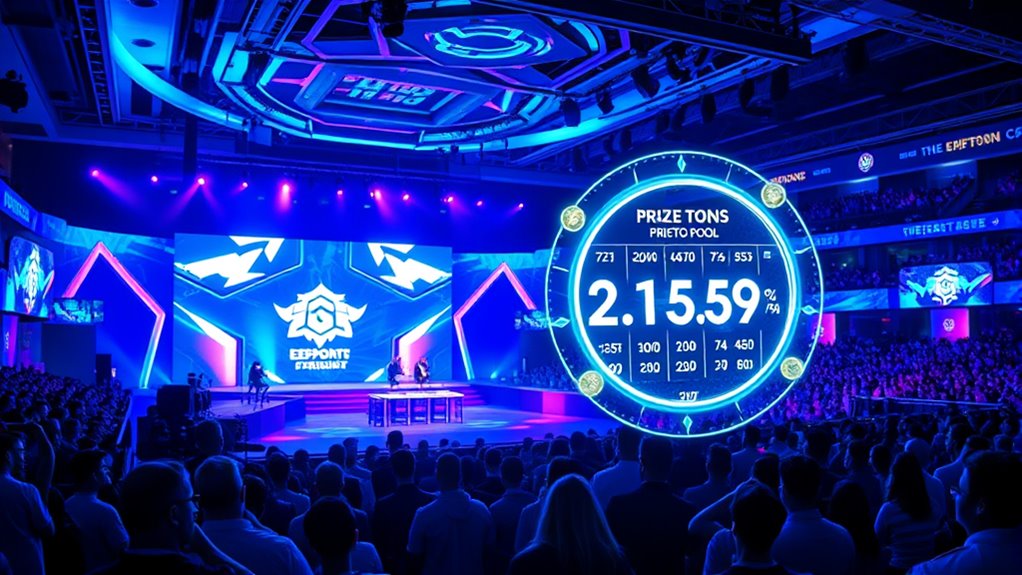Esports meets crypto through tokenized prize pools that use blockchain technology to make rewards transparent, secure, and easy to distribute. With smart contracts, payouts happen automatically based on pre-set conditions, reducing disputes and delays. Participants can see all transactions, building trust and accountability. Plus, winners can receive unique NFTs that hold future value. To discover how this innovation is transforming the industry, keep exploring the details behind this exciting fusion.
Key Takeaways
- Tokenized prize pools leverage blockchain to securely and transparently distribute rewards in esports tournaments.
- NFTs can be awarded as unique, tradable digital assets representing in-game items or collectibles.
- Smart contracts automate prize payouts, reducing delays and disputes in reward distribution.
- Blockchain ensures transparent fund tracking, fostering trust among players, organizers, and fans.
- This integration promotes global participation, decentralizes funding, and enhances the esports ecosystem’s growth.

Esports has revolutionized competitive gaming, attracting millions of players and fans worldwide. As the industry evolves, so do the ways tournaments are financed and rewarded. One of the most exciting developments is the integration of crypto and blockchain technology into prize pools. This shift isn’t just about adding digital currencies; it fundamentally changes how rewards are distributed, tracked, and verified. You might wonder how this works and why it matters. At the core, blockchain transparency plays a pivotal role, ensuring that every transaction related to prize pools is secure, immutable, and publicly verifiable. When you participate in an esports tournament with crypto-based prize pools, you gain confidence that the prize distribution is fair and tamper-proof, thanks to the transparent nature of blockchain networks.
Blockchain transparency ensures fair, secure, and verifiable prize distributions in esports tournaments.
NFT integration takes this innovation further by allowing unique digital assets to be part of the prize ecosystem. Instead of just cash or traditional prizes, players can win exclusive non-fungible tokens (NFTs). These tokens can represent anything from in-game assets to digital collectibles, giving winners more than just a monetary reward—they receive something with potential future value or utility. This integration adds a new layer of excitement and personalization to the competitive scene, making victories more memorable and valuable beyond the immediate payout.
Using blockchain transparency, you also benefit from seamless and secure transactions. Since all prize pool contributions and payouts are recorded on a blockchain, there’s no need to trust a third party or worry about fund misappropriation. Smart contracts automate the distribution process, releasing funds only when certain conditions are met, which reduces delays and disputes. This setup gives players and organizers a clear view of the entire financial flow, fostering trust and accountability. It also enables global participation, as crypto transactions can be processed quickly across borders without heavy fees or restrictions. Moreover, the ability to leverage digital assets enhances overall financial inclusion, allowing more diverse participation in esports economies.
Furthermore, this decentralized approach democratizes the esports scene. Smaller tournaments can access funding more easily, and players from around the world can compete without the hurdles of traditional banking systems. As you follow or participate in these events, you’ll notice how crypto-powered prize pools make the ecosystem more accessible and transparent. The combination of NFT integration and blockchain transparency isn’t just a technological upgrade—it’s a way to empower players, organizers, and fans alike, creating a more fair, innovative, and engaging esports environment that’s poised to grow even further.
Frequently Asked Questions
How Do Tokenized Prize Pools Impact Player Earnings Stability?
Tokenized prize pools can make your player income more unpredictable because of prize variability. While they give you access to larger, more dynamic rewards, fluctuations in token value or pool size can cause income swings. You might earn more during high-value events, but there’s also a risk of earning less when token prices drop. So, your earnings become less stable and depend on both event outcomes and token market trends.
Are There Legal Concerns With Tokenized Esports Prize Pools?
You might wonder if there are legal concerns with tokenized esports prize pools. Yes, legal compliance and regulatory challenges can arise, especially since different jurisdictions have varying rules on digital assets and gambling. You should stay informed about local laws to avoid penalties. It’s vital to guarantee your tokenized prize pools follow all applicable regulations, so you’re not exposed to legal risks or potential disputes.
How Do Tokenized Pools Ensure Fairness in Competition?
You can trust tokenized pools to guarantee fairness because they use smart contract security to automate prize distribution, reducing human error and manipulation. Transparency measures, like public blockchain ledgers, allow you to verify that rules are followed and prizes are awarded correctly. This combination makes it clear that winners are determined fairly, giving you confidence that the competition remains honest and transparent throughout the process.
Can Tokenized Prize Pools Be Used Across Different Games?
You might wonder if tokenized prize pools can be used across different games. The answer is yes, thanks to cross game compatibility and prize pool interoperability. Developers can design tokens that work seamlessly across multiple titles, enabling players to deposit, wager, or earn rewards in various games with a single token system. This promotes a unified ecosystem, making it easier for gamers to access and benefit from prize pools regardless of the game they play.
What Are the Risks for Investors in Esports Token Pools?
You face risks like market volatility, which can cause token values to fluctuate unpredictably, and regulatory uncertainty, as governments may change laws affecting esports tokens. These factors can impact your investments’ stability and legality. Stay informed about industry trends and legal developments, and consider diversifying your portfolio. Being aware of these risks helps you make smarter decisions and manage potential losses effectively.
Conclusion
As you explore the world of esports and crypto, you’ll see how tokenized prize pools are transforming competitions. They offer transparency, accessibility, and new ways to engage with your favorite games. By understanding this innovative approach, you’re better equipped to appreciate the future of competitive gaming. Embrace the potential of crypto-enabled prize pools, and stay ahead of the curve in this exciting crossover. The gaming landscape is evolving—be part of the revolution.








